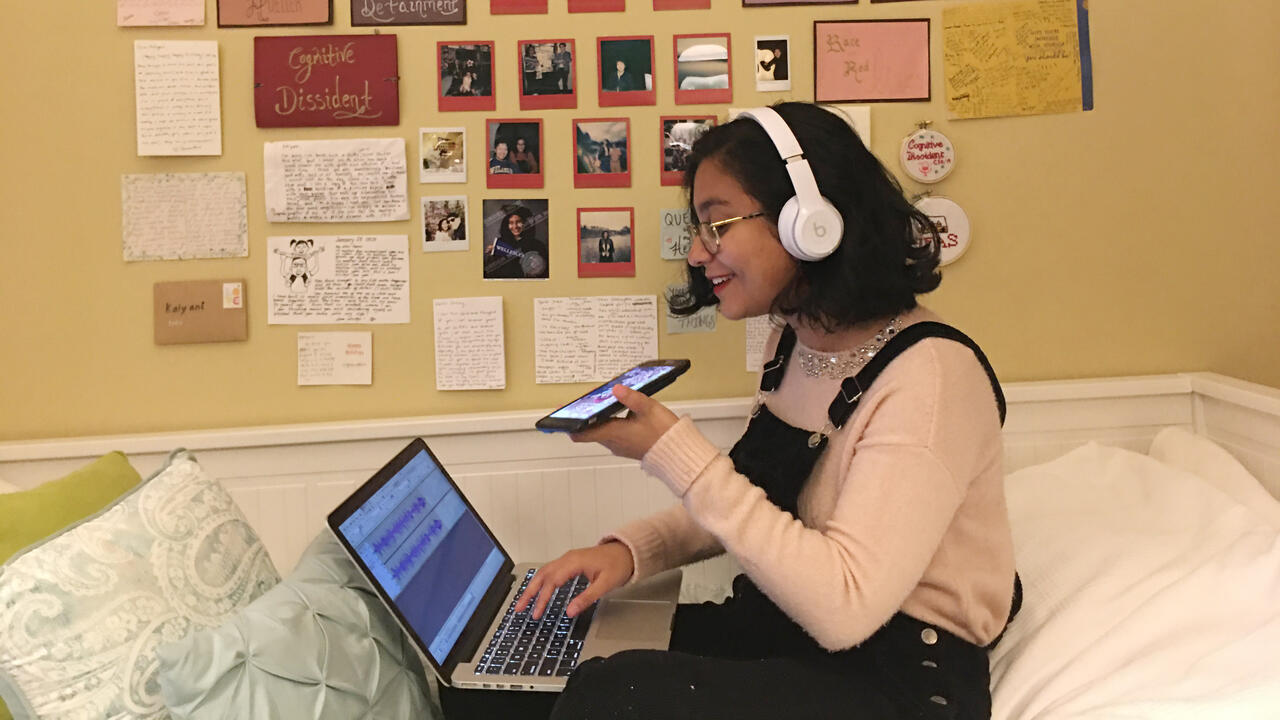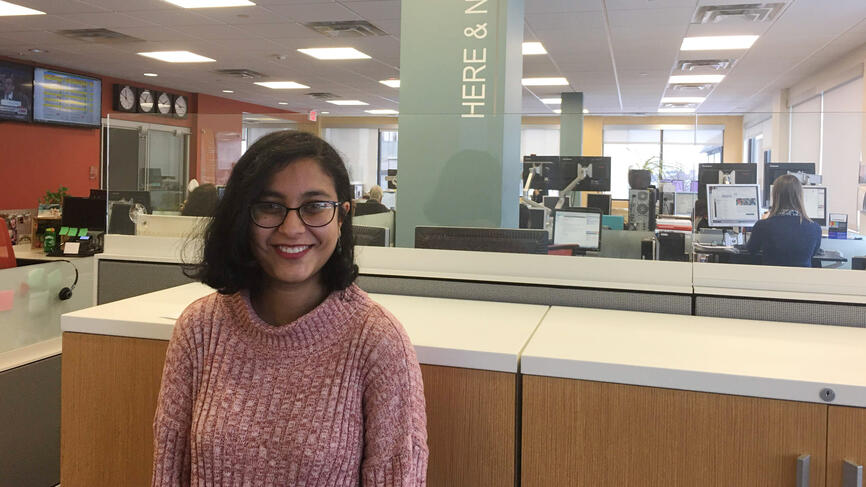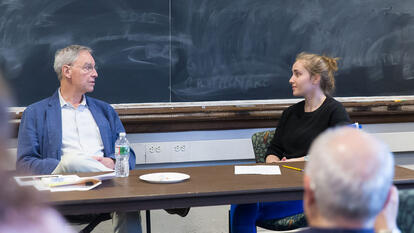
Wellesley Student Uses Podcast and WBUR Internship to Highlight Voices Society Tends to Ignore
As a child growing up in Atlanta and Mumbai, Kalyani Saxena ’20 would dramatically read the news aloud to her family, pretending to have a British accent as a CNN anchor (her parents kept the recordings). Now, Saxena is covering her own news stories, and it’s her real voice coming across the airways through her podcast, Cognitive Dissident, in which she explores “politics and the people history likes to ignore.”
“It’s funny looking back at those moments,” she said, “because I didn’t really think about journalism as a path early on. I just always cared about people’s stories, but I didn’t yet know what avenues to channel that into.”
Wellesley is where her path started to take shape—and she almost didn’t get there. Though she wanted to attend a women’s college, Wellesley wasn’t on her list. “Everyone around me said Wellesley would be a great fit for me,” Saxena said, “but I was a contrarian teenager, and it wasn’t until I visited campus—kicking and screaming, really—that my mindset completely changed. I realized that this was the place I could become the person I wanted to be, and where there were people that could help me do that.”
Saxena’s tour guide, Leah Schwartz ’18, helped Saxena see herself at the College. “It was her story about a professor who would go the extra mile for her and let her sit on the floor of her office and play with golden retrievers that really clinched the deal,” she recalled. “Interestingly enough, that same professor, Stacie Goddard, would end up being instrumental in my journey a few years later.”
Wellesley, Washington, and WBUR
In her classes with Paul MacDonald, associate professor of political science, and Laura Grattan, Jane Bishop '51 Associate Professor of Political Science, Saxena said she learned to look critically at the world around her, to question systems, authority, and history. She decided to major in political science, and she participated in the Wellesley in Washington program in the summer of 2019.

Political science professor Stacie Goddard’s class, World Politics, in the fall of 2017, set the stage for some of her most formative experiences. Saxena worked as Goddard’s research assistant starting in her junior year, and Goddard helped Saxena land a fall 2019 internship at Here & Now at WBUR by introducing her to Cassady Rosenblum ’13, an associate producer for the show. As an intern, she learned about audio production, crafting stories for radio, and navigating a blisteringly fast-paced news cycle. Saxena pursued three original story ideas that she pitched, about how hairstylists can help detect hard-to-find melanomas, immigration issues, and domestic violence.
“Pitching to a roomful of editors was the kind of nerve-wracking yet exhilarating experience that gets seared in your brain forever,” she said. “It’s a feeling I’m still chasing all these months later.”
Saxena had to push to get a piece she pitched about the role of digital apps in domestic violence produced as the impeachment trial was saturating the media at the time. “I’m really interested in stories that have the opportunity to highlight and uplift the voices of those on the margins of society, and at that point in my internship, I didn’t feel like I had done enough to tell the stories that mattered to me,” she said. “When I found this topic, it was like a jolt went through me. We all feel a little watched in this day and age (because we are), but many don't think about how being watched is more dangerous for some of us than others, namely black and brown people and survivors of sexual assault and/or domestic violence.”
Her story garnered widespread attention—it rose to the top of the most-read list on Here & Now and was syndicated on national NPR stations, and Sen. Kamala Harris shared Saxena’s story on Twitter, just hours before dropping out of the 2020 presidential race.
At Wellesley, Saxena has learned some of the crucial skills she’ll need to continue in this field. “The biggest thing that Wellesley gave me was the space to have conversations that challenged the role of institutions in the world around me,” Saxena said. “I am a much more radical and critical thinker now than I was when I entered college, and I think that not being afraid to ask hard questions and have difficult conversations will serve me well as a journalist.”
Next episode
A few days after Wellesley announced the shift to remote instruction in mid-March, Saxena set out to capture the voices, concerns, and experiences of students living amid COVID-19—particularly her fellow seniors, whose spring traditions and celebrations were going to be cut short.
“The biggest thing that Wellesley gave me was the space to have conversations that challenged the role of institutions in the world around me... and I think that not being afraid to ask hard questions and have difficult conversations will serve me well as a journalist.”
Kalyani Saxena ’20
“I’m going to try my best as a journalist to capture what was going on in this moment in time, as difficult and painful as it is for me,” she says at the start of her podcast’s episode “A Campus Amidst Coronavirus.”
Saxena feels deeply the uncertainties that the pandemic poses. She has been applying for journalism jobs across the country at a time when many members of the media are being furloughed or laid off. “My dream and hope is to still stay in journalism—this is when we need journalists more than ever,” she said. She is also looking for freelance opportunities and working on her podcast.
“I started the podcast because I was having some really great conversations with my peers at Wellesley, but when I’d ask to hear their opinions about politics they’d clam up,” she said. “So many of them said they felt they didn’t know ‘enough.’ As someone who often felt left behind by the fast pace of mainstream coverage, this really resonated with me. I wanted to create coverage that broke down seemingly complicated stories into accessible chunks. Young people need to be engaged the most in this moment—with climate change, xenophobia, and the rise of the far right all on the horizon. The media industry poses huge barriers to entry, particularly for journalists of color, and I want to do what I can to bring these issues to young people from a young person.”

